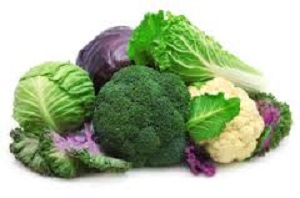Eat your greens and you will grow up to be big and strong, parents are fond of telling their children.
Scientists believe they have found an extra reason why sprouts and broccoli are so good for us.
A sugar molecule found in cabbage, spinach and other leafy greens has been discovered that helps the good bacteria in our stomachs flourish.
And when good bacteria are plentiful in our stomach, it leaves little room for ‘bad’ bacteria to grow.
Bad bacteria – the horrible bugs that give us stomach aches and worse – can’t get a foothold in the stomach if all the good spaces are taken.
The finding adds to all the reasons greens are great for us – including vitamins, minerals and roughage.
The sugar, called sulfoquinovose, SQ for short, is abundant in nature and is unusual because it is the only sugar that contains sulphur.
But until now it was not known how bacteria could make use of it – the latest discovery has found that bacteria create an enzyme that can break it down.
Dr Ethan Goddard-Borger, said the discovery could be exploited to cultivate the growth of ‘good’ gut bacteria. This includes ‘good’ forms of E Coli.
The vast majority of E Coli bacteria are beneficial for health – but the bacteria get a bad name because a small minority of E. coli types can cause food poisoning.
Dr Goddard-Borger said: ‘Every time we eat leafy green vegetables we consume significant amounts of SQ sugars, which are used as an energy source by good gut bacteria,’
‘Bacteria in the gut, such as crucial protective strains of E. coli, use SQ as a source of energy.
‘This work answers a 50-year mystery that has surrounded how sulphur – an element essential for life on Earth – was used and recycled by living organisms.
‘What is remarkable is that the YihQ enzyme was hiding in plain sight and is produced by the humble bacterium E. coli, present in nearly every biologist’s laboratory.’
The discovery also provides crucial insights that may one day be exploited to develop an entirely new class of antibiotics, Dr Goddard-Borger said.
‘New antimicrobial strategies are desperately needed as more and more bacteria acquire resistance to existing classes of antibiotics.’
‘We think it will be possible to use these widespread enzymes to enable highly specific delivery of antibiotics to harmful forms of E. coli and other pathogens, such as Salmonella, responsible for food poisoning, while leaving the good gut bacteria untouched.’
Source: Daily mail
N.H.Kh

